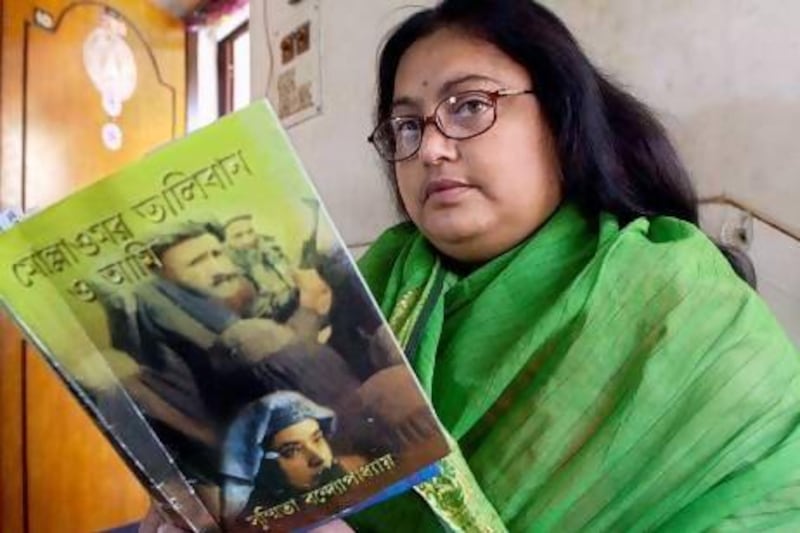NEW DELHI // On her most recent trip to Kolkata for Eid Al Fitr, the Indian author Sushmita Banerjee made sure she took a taste of home back to Afghanistan.
She bought soya sauce, vinegar and Chinese spices for the dishes she would cook for her husband in Paktika, 200 kilometres south of Kabul.
"She was going back to Afghanistan after a long time," said Swapan Kumar Biswas, her publisher and friend. "Naturally, we were all worried for her but she assured us that things had changed."
On Thursday, Banerjee, whose daring escape from the Taliban nearly two decades earlier made her famous, was found dead outside her husband's home. She had been shot 25 times by militants.
She was best known for her memoir, Kabuliwala's Bengali Wife, in which she told how she managed to flee Afghanistan as the Taliban tightened its grip in the 1990s.
The book was adapted into a screenplay for the 2003 Bollywood film Escape From Taliban, starring Manisha Koirala.
She also wrote several other books about her time in Afghanistan.
Police said Banerjee was dragged outside late in the night and shot, adding that masked men had tied up the writer and her husband before executing her. The Taliban denied killing her.
Banerjee, 49, was married to Jaanbaz Khan, an Afghan businessman. She changed her name to Sahib Kamala after converting to Islam when they married in 1989.
After the fall of the Taliban, Ms Banerjee travelled between India and Afghanistan but spent most of her time in Kolkata with Mr Khan.
Her memoir about living under Taliban rule was published in 1998 and was translated into English the next year. Kabuliwala's Bengali Wife has sold more than 700,000 copies, said Mr Biswas.
"At first when I read the book I was amazed at her adventures, her determination to escape the clutches of the Taliban," she said. "I remember selling up to 600 copies a day at the Calcutta Book Fair."
She moved to Afghanistan after marrying Mr Khan, who spent most of his time in Kolkata, where he had a garment business. Banerjee stayed in Afghanistan, saying "life was tolerable" until the rise of the Taliban in 1993.
She ran a dispensary but the militants disapproved.
"The members of the Taliban who called on us were aghast that I, a woman, could be running a business establishment. They ordered me to close down the dispensary and branded me a woman of poor morals," Banerjee wrote in India's Outlook magazine.
She was beaten several times for refusing to wear a burqa, she said.
In her memoir, Banerjee wrote that in 1994 she decided to leave the country. A neighbour helped to smuggle her across the border to Islamabad.
She was turned away at the Indian embassy, because she did not have her passport. Her brothers-in-law took her back home to Afghanistan, promising to send her to India.
But the Taliban put under house arrest, called her an immoral woman for trying to abandon her family and beat her.
One night she dug a hole through the wall of her mud home, trying to reach the Indian embassy in Kabul. This time she was captured in the streets outside by a Taliban team and interrogated.
She said she was certain they would kill her for abandoning her family but she managed to convince them she was an Indian citizen. They let her go and she returned to India.
Ujjwal Chatterjee, director of Escape From Taliban, said he remembered meeting Banerjee in 2001.
"She had a lot of helpful suggestions for the cast and crew," Mr Chatterjee said. "We were taken aback by her stories about the lack of women's rights. She always talked about going back to help them."
Banerjee returned to Afghanistan last month to work in the medical field, helping women gain access to health care.
She trained as a nurse during her time in India and was said to have been filming women in their daily lives in her village, and their lack of health care, reported Ei Samay, a Bengali newspaper.
Before she left for Afghanistan, Ms Banerjee borrowed four Bengali books from Mr Biswas, her publisher.
"I told her not to go," Mr Biswas said. "But she told me: 'I want to write another book about the women in Afghanistan. I haven't given you a good manuscript in a while. Let me do this'."





